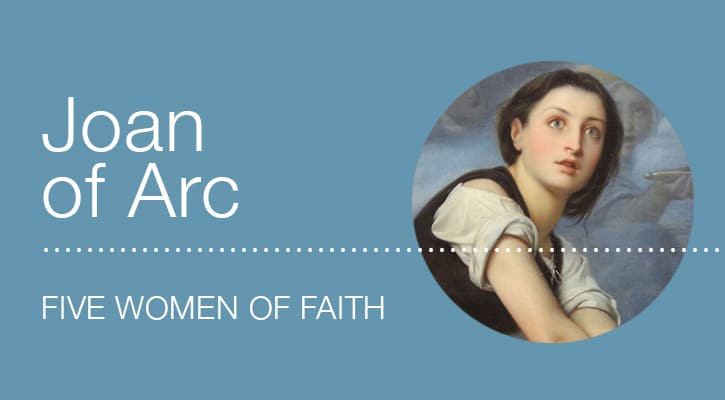St. Joan of Arc (1412–1431)
Joan of Arc, famous among all Christians and non-Christians for her unique place in European history, was brought up like any other peasant girl in Domrémy, France. She did not learn how to read or write, but was able to recite the Creed, the Our Father, and the rosary, and to practice the feminine arts of sewing and spinning. All the village loved her for her gentleness and piety.
Joan was an obedient child and gave her parents no cause for alarm until the famous vision when she was 13. She was instructed to help restore the weak, hopeless, pleasure-loving Dauphin Charles VII to assume his rightful throne against the allied forces of the English and the Burgundians. Voices that she thought were those of St. Michael the archangel, St. Catherine, and St. Margaret came to her insistently, demanding that she go to the dauphin and encourage him to enter the battle seriously.
It was during her first journey to the dauphin that she adopted male dress, not in order to look masculine, but to protect her virginity against the lusts of the soldiers she would encounter.
She gained credence when she identified the dauphin who was disguised. By means of her supernatural knowledge, she was able to convince the dauphin that her mission was from God. She then asked to be equipped with soldiers to lead the battle, her standard bearing the words, “Jesus, Maria.” Her first battle turned the tide of war in favor of France. Charles was afterward solemnly crowned to the great joy of Joan and the people.
Later, however, she lost battles because of the lack of support of the king. Finally, she was captured by the Burgundian allies of the English, who sold her to the English. Her enemies trumped up an ecclesial trial claiming that she was a sorceress and a heretic. She defended herself courageously, but the judgment of the court was that her revelations were from the devil, not from God. She was burned at the stake by the secular authorities, commending her soul to Jesus. One of the English dignitaries after witnessing her holy death, cried out, “We are lost: we have burned a saint!”
Later her mother and brothers insisted on a review of the case and she was totally exonerated. She was canonized in 1920.
“One life is all we have and we live it as we believe in living it.
But to sacrifice what you are and to live without belief, that is a fate more terrible than dying.”
St. Joan of Arc









5 thoughts on “Five Women of Faith: St. Joan of Arc”
I’ve always loved Joan of Arc for her courage and her faith and determination and never backing down from what she knew was the truth. may we all do the same.
thank you .
Great article of sacrifice and redemption.
St. Joan is one of my three saint friends, the others being St. Teresa of Avila and an Irish de facto saint who is not yet canonized. These three, I believe, directly guided me and profoundly influenced my life. St Joan, I believe, came to me first, when I was only 11, and turned my soul back to God instantaneously. I thought it was only my admiration for her because at that time, as a lifelong Methodist, I didn’t believe saints could really act in our lives, but from that time I was determined to o become Catholic. When I converted at age 27, I took her name as my confirmation name. So she is really, really special to me, like an older sister in the Faith.
What a beautiful witness you are, Shirley. Thank you for sharing.